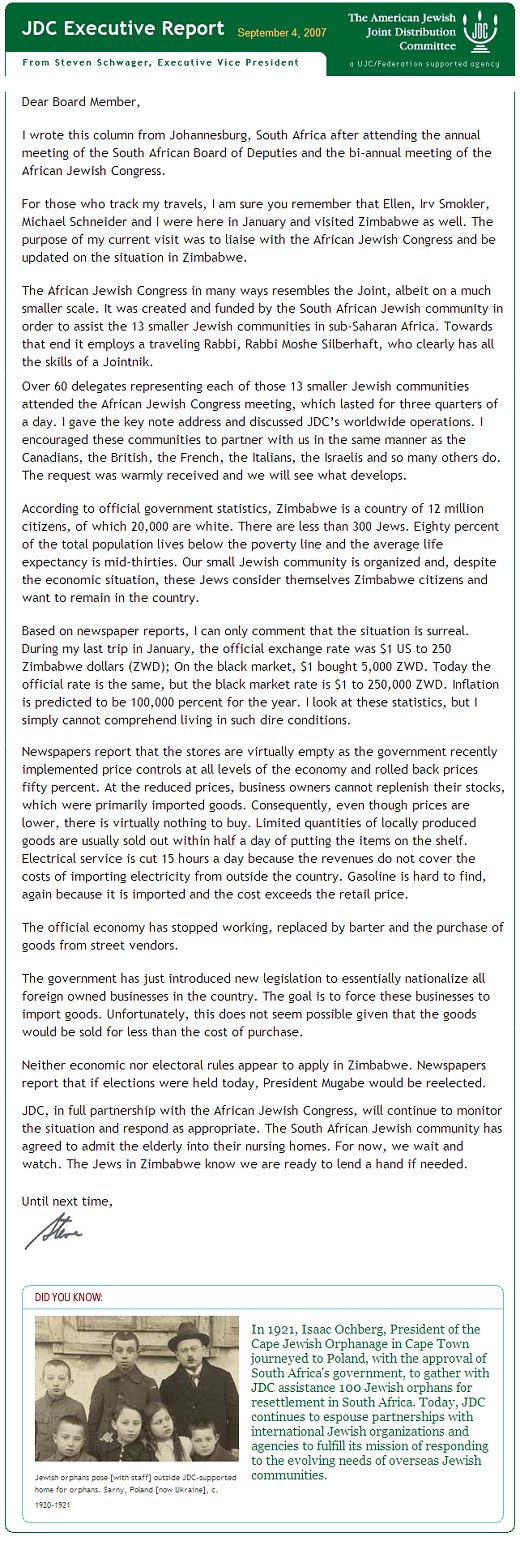|
SMALL COMMUNITIES KEEP THE FAITH THROUGH THE AFRICAN JEWISH CONGRESS – AUGUST 2007
As expected, Zimbabwe was the main talking point of the agenda of the annual meeting of the African Jewish Congress (AJC), held at Beyachad on Monday immediately after the SAJBD’s national conference. Delegates or spokespeople representing Botswana, Mauritius, Mozambique, Namibia and Zimbabwe attended, together with AJC Mervyn Smith and other members of the AJC committee, SAJBD representatives and other communal leaders. The AJC was founded in 1993 to act as the representative body for the Jewish communities in Sub-Saharan African countries and to assist the smaller African Jewish communities in establishing and maintaining contact with the wider Jewish world.
Keynote speaker at the meeting was Steve Schwager, director of the American Jewish Joint Distribution Committee (JDC). Also present was former JDC director Michael Schneider, who was recently appointed Secretary-General of the World Jewish Congress.
Schwager gave an overview of the work of the JDC, commonly known as the ‘Joint”, focusing specifically on what it was doing on behalf of needy Jews in the Former Soviet Union, Israel and Africa. The latter included assisting Zimbabwean Jewry, in particular its aged home, Savyon Lodge, in Bulawayo. In all, the JDC was responsible for feeding some 225 000 Jews around the world, in over 3000 cities across eleven time zones.
A special closed session was devoted to discussing the political and economic crisis in Zimbabwe and how it was affecting the country's 250-strong Jewish community. Perspectives on the ground were provided by Peter Sternberg, AJC vice-president and past president of the Zimbabwe Jewish Board of Deputies (ZJBD), current ZJBD president Sam Benatar, Hylton Solomon, president Bulawayo Hebrew Congregation and Brian Sher, director of the Jewish aged home in Bulawayo, Savyon Lodge.
Contrary to what some might have expected, the picture that emerged from the four Zimbabwe representatives was not one of a community in panic, although none played down the gravity of the problems it was facing.
Solomon, who runs a grocery store, remains committed to helping keep Bulawayo's 113 year-old Jewish community going. He was recently gaoled for "overpricing" pasta, yet is often pained to hear of ex-Zimbabweans in other parts of the world running their former country down. Such people, he felt, also needed to remember how much Zimbabwe had given them, no matter how serious its troubles now might be.
There are three function synagogues in Zimbabwe, two in Harare (one Sephardi and the other Ashkenazi) and the other in Bulawayo. The two congregations in Harare, while not formally amalgamating, now combine with one another for Shabbat services, which alternate between the two shuls. Sharon School in Harare is still run as a “Jewish day school” although today only five of its 300 pupils are Jewish. It is regarded as one of the leading private schools in the country.
Savyon Lodge currently has 23 residents. It survives largely through the financial support of international Jewry, specifically from the Joint Distribution Committee and the Weinberg Foundation, this aid being channelled through the African Jewish Congress in Johannesburg. The home is willing and able to take in additional residents, but most Zimbabwean Jews (three-quarters of whom are over the age of seventy) prefer to continue living in their own homes. The general feeling is that most Jews who wished to leave Zimbabwe have already done so and the remainder are committed to remaining in the country notwithstanding the difficulties involved.
In the course of the report-back dealing with Mozambique, Vivienne Pivo presented Hyman Jocum with a collage detailing the history of the Maputo synagogue for his extensive research on the history of Lourenco Marques/Maputo Jewry. The collage was compiled by Pivo, whose grandfather was instrumental in the establishment of the synagogue in 1926.
During the report-back on Mauritius, Mauritian Geoff Geffroy related his personal search to discover the roots of his Jewish identity and of how his boyhood spent in close physical proximity with the 1670 Jewish refugees from Nazi-occupied Europe who were detained on the island by the British authorities after being denied entry into Palestine.
The report-backs on Namibia and Botswana were given by Harold Pupkewitz and Richard Lyons, both long-serving members of their respective Jewish communities. In both countries, there are significant numbers of Israelis living and working, but it is proving difficult to get them to identify with the local Jewish communities.
All speakers paid special tribute to Rabbi Moshe Silberhaft, Spiritual Leader to the AJC. Rabbi Silberhaft, in addition to his work within the SAJBD’s Country Communities Department, regularly travels to the affiliated countries to, amongst other things, officiate at religious services and life-cycle events and oversee the maintenance of Jewish cemeteries.
At the conclusion of the meeting Ann Harris and Hylton Solomon were newly elected onto the AJC committee. Re-elected were Mervyn Smith (President), Richard Lyons, Harold Pupkewitz and Peter Sternberg (vice-presidents) and committee members Abe Barron, Irene Zuckerman and Jenny Kahn.
Guest speaker at the dinner afterwards was Dr Mongezi Guma, chairperson of the Cultural, Religious and Linguistic Commission. He was introduced by Marlene Bethlehem, deputy chairperson of the Commission.
|
